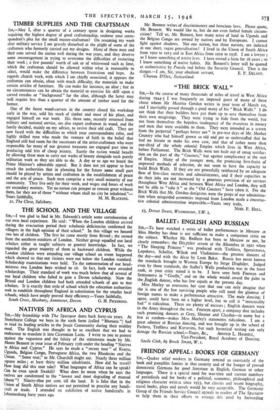TIMBER SUPPLIES AND THE CRAFTSMAN
SIR,—May I, after a quarter of a century spent in designing works requiring the highest degree of good craftsmanship, endorse your corre- spondent's plea for the small master-craftsman? On resuming my work after military service I am gravely disturbed at the plight of some of the craftsmen who formerly carried out my designs. Many of these men and their sons served the nation well during the war years, and they deserve some encouragement in trying to overcome the difficulties of restarting their work ; a few pounds' worth of oak or of whitewood such as lime, which the craftsman should be allowed within what is reasonable to select, would make the difference between frustration and hope. As regards church work, with which I am chiefly associated, it appears the craftsman can obtain, often with much difficulty, the materials to make certain articles of furniture. He can make for instance, an altar ; but in no circumstances can he obtain the material to exercise his skill upon a carved reredos or " background " for the altar, although the latter may well require less than a quarter of the amount of timber used for the former.
One of the finest wood-carvers in the country closed his workshop early in the war, sold his stock of timber and most of his plant, and engaged himself on war work. His three sons, recently returned from military and national service, are also expert craftsmen in wood, and the family decided, mainly on my advice, to revive their old craft. They are now faced with the difficulties to which your correspondents refer, and highly skilled men who made the venture of faith in the belief that England still had room for the successors of the artist-craftsmen who were responsible for many of our greatest treasures are engaged part time in producing odd bits of cheap joinery. Surely the nation would benefit by allowing these men to carry out works of beauty alongside such purely utilitarian work as they are able to do. A day or so ago we heard the Prime Minister's admirable appeal. But it does not yet appear to have struck the authorities that in planning for the future some small part should be played by artists and craftsmen in the establishment of peace and the arts of peace. Such men comprise a very small minority of our community. They live only for their work, and wages and hours of work are secondary matters. Yet no nation can prosper or remain great without them, for they are of those " without whom shall no city be inhabited."—


























 Previous page
Previous page